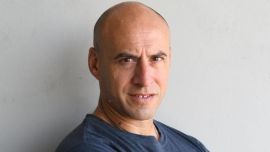Argentina's ruling Frente de Todos coalitionsuffered a heavy defeat in Sunday’s PASO primaries, piling pressure on President Alberto Fernández and his government.
The Peronist coalition lost unexpectedly in the Buenos Aires Province, the movement's traditional heartland, while recording notable losses in Buenos Aires City, the nation’s capital, as well as the provinces of Córdoba, Santa Fe and Mendoza.
The government emerged victorious in only five provinces overall and was left with wounds to lick in the majority of districts.
Onstage at the Frente de Todos bunker in Chacarita on Sunday night, President Fernández admitted that “errors” had cost his government and vowed to meet society’s “demands.” The Peronist leader then called on his supporters to help him make the case to voters ahead of November’s crunch midterm elections.
“We listen to it [the result] with respect and great attention,” said the president, who was joined onstage by the coalition’s key leaders, including Vice-President Cristina Fernández de Kirchner.
“We have made mistakes, and there is a demand that we have not satisfied," he conceded.
Painful
The most painful result for the Peronist coalition was also its most unexpected: a heavy defeat in Buenos Aires Province, the nation’s key battleground where around a third of the electorate lives.
Before the primaries, analysts were mostly forecasting a slim win in the race for deputy for the single Frente de Todos list headed by Victoria Tolosa Paz. But with 96 percent of the vote counted on early Monday morning, the opposition had a near five-point lead. Its two slates – led by Diego Santilli and Facundo Manes respectively – had taken 38 percent of the overall vote, prompting dismay in the Chacarita bunker.
Poor results for the ruling coalition were repeated in the provinces of Córdoba and Santa Fe, where the government’s Senate seats are now at risk in the upcoming elections.
In Córdoba, Frente de Todos finished third, while in Santa Fe, Casa Rosada ally Governor Omar Perotti lost by a wide margin to Juntos por el Cambio.
Even the expected defeats were painful. The opposition’s win in Buenos Aires City was anticipated, but the performance of Leandro Santoro was disappointing. Unsurprising losses were also recorded in the provinces of Mendoza, Corrientes and Jujuy, three regions lead by Radicals.
Unexpected, and unwelcome, defeats then came in the provinces of Chaco, Vice-President Cristina Fernández de Kirchner's home region in Santa Cruz, La Pampa and Chubut. Frente de Todos also fell in Entre Ríos, Misiones, Salta, Tierra del Fuego and San Luis. In Neuquén and Río Negro, the ruling coalition lost to local parties.
When the dust settled, only five provinces had delivered victories: Catamarca, Formosa, La Rioja, San Juan, Tucumán.
If the same results were to be repeated in November, Frente de Todos would lose six senators and its majority in the upper house. In the lower house, its bloc would drop from 120 to 111, versus 118 for Juntos por el Cambio.
'Opportunity'
As a jubilant and thankful María Eugenia Vidal addressed officials and supporters from a stage in Costa Salguero on Sunday night, she said that voters had handed the opposition “an opportunity” ahead of the coming midterms.
Later she told the TN news channel that the opposition must focus on the race to shift the balance of power in Congress, declaring that voters had called for “a bloc that impedes the ruling majority and defends the Constitution and the Republic."
This time “there is no going back,” she added, saying that the government’s “cynicism and lies” had to end.
Confidence will be sky high among the leaders of Juntos por el Cambio in the build-up to November, especially with its slate of candidates now decided. Internal battles can now be put aside.
Vidal – a former governor of Buenos Aires Province who switched to the capital under the wing of City Mayor Horacio Rodríguez Larreta – put in one of Juntos por el Cambio’s strongest performances in the PASO, seeing off internal challenges from Ricardo López Murphy and Adolfo Rubinstein, while easily defeating Santoro, Frente de Todos’ candidate for national deputy.
With 98 percent of polling stations reporting in the capital, the opposition’s slates had 48.2 percent of the vote, while Santoro had just 24.6 percent.
Other notable winners from the night include Santilli, who resigned as City deputy mayor to run for office in Province and managed to see off the popular Manes, whose list picked up more than 1.2 million votes in what was the neuroscientist’s first run for office.
Another notable winner came in Córdoba, where Luis Juez gained the most votes for the opposition despite rival Mario Negri being backed by former president Mauricio Macri. Together the duo took close to 50 percent of votes in the province, in both lists for senators and deputies.
Perhaps the opposition’s biggest winner of the night, however, wasn’t on the ticket: Rodríguez Larreta. The City mayor, who favours a 2023 presidential run, saw Vidal and Santilli, candidates he blessed and pushed for, score big wins. These victories will strengthen his position, and his case, especially against the hawks in the centre-right coalition that took Macri to power in 2015.
‘Clear message’
Returning to his most common theme on the campaign trail, President Fernández said in his speech Sunday night that Argentina had to “move forward” and not go “back,” as he suggested the country had under his predecessor in office.
The primaries were the president’s Alberto Fernández’s first electoral test since taking office in December 2019, just three months before Argentina registered its first case of Covid-19.
Since then, more than five million have been infected (and have recovered), while more than 113,000 more have lost their lives from the virus. Vaccination is progressing though, with cases per day registering a consistent downward decline.
Speaking to Jorge Lanata on the TN news channel on Sunday evening, Macri described the result as a “clear message” from the electorate to Fernández’s government.
“There was a clear message from an Argentina that said enough to the lies, enough to ineptitude, enough to immorality,” he declared. “The opportunity for Argentina has truly been born. We are beginning to see the end of populism in our country.”
Along these lines, he added: "The people are giving us a share of greater responsibility to try to stop this army of destruction,” he declared, painting the ruling coalition as a front controlled by Vice-President Fernández de Kirchner and her backers.
Government sources told the Noticias Argentinas news agency early Monday morning that the results were a "disappointment," but that they were already looking ahead to November.



















Comments